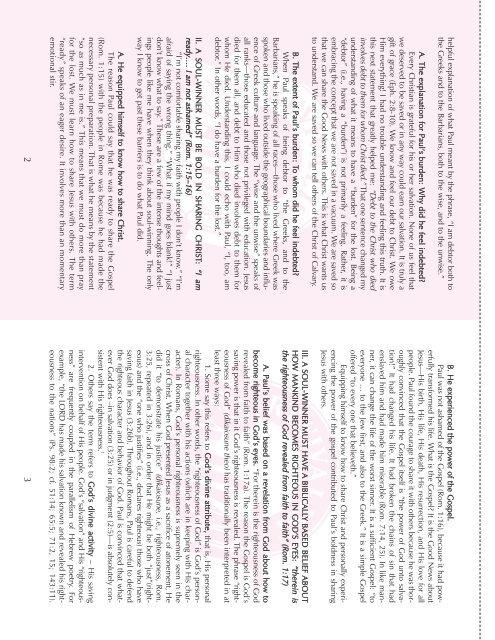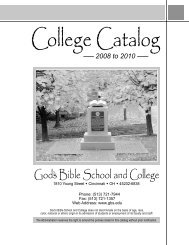Download the October Issue - God's Bible School & College
Download the October Issue - God's Bible School & College
Download the October Issue - God's Bible School & College
You also want an ePaper? Increase the reach of your titles
YUMPU automatically turns print PDFs into web optimized ePapers that Google loves.
helpful explanation of what Paul meant by <strong>the</strong> phrase, “I am debtor both to<br />
<strong>the</strong> Greeks and to <strong>the</strong> Barbarians, both to <strong>the</strong> wise, and to <strong>the</strong> unwise.”<br />
A. The explanation for Paul’s burden: Why did he feel indebted<br />
Every Christian is grateful for his or her salvation. None of us feel that<br />
we deserved to be saved or in any way could earn our salvation. It is truly a<br />
gift of grace (Eph. 2:8-10). We know and feel our debt to Christ. We owe<br />
Him everything! I had no trouble understanding and feeling this truth. It is<br />
this next statement that greatly helped me: “Debt to <strong>the</strong> Christ who died<br />
involves debt to <strong>the</strong>m for whom Christ died.” That one sentence changed my<br />
understanding of what it means to have a “burden” for <strong>the</strong> lost. Being a<br />
“debtor” (i.e., having a “burden”) is not primarily a feeling. Ra<strong>the</strong>r, it is<br />
embracing <strong>the</strong> concept that we are not saved in a vacuum. We are saved so<br />
that we can share <strong>the</strong> Good News with o<strong>the</strong>rs. This is what Christ wants us<br />
to understand. We are saved so we can tell o<strong>the</strong>rs of <strong>the</strong> Christ of Calvary.<br />
B. The extent of Paul’s burden: To whom did he feel indebted<br />
When Paul speaks of being debtor to “<strong>the</strong> Greeks, and to <strong>the</strong><br />
Barbarians,” he is speaking of all races—those who lived where Greek was<br />
spoken and those who lived outside <strong>the</strong> geographical boundaries and influence<br />
of Greek culture and language. The “wise and <strong>the</strong> unwise” speaks of<br />
all ranks—those educated and those not privileged with education. Jesus<br />
died for <strong>the</strong>m all, and debt to Him who died involves debt to <strong>the</strong>m for<br />
whom He died. Understanding this, I could echo with Paul, “I, too, am<br />
debtor.” In o<strong>the</strong>r words, “I do have a burden for <strong>the</strong> lost.”<br />
II. A SOUL-WINNER MUST BE BOLD IN SHARING CHRIST: “I am<br />
ready…. I am not ashamed” (Rom. 1:15–16)<br />
“I’m not comfortable sharing my faith with people I don’t know.” “I’m<br />
afraid of saying <strong>the</strong> wrong thing.” “What if my mind goes blank!” “I just<br />
don’t know what to say.” These are a few of <strong>the</strong> intense thoughts and feelings<br />
people like me have when <strong>the</strong>y think about soul-winning. The only<br />
way I know to get past <strong>the</strong>se barriers is to do what Paul did.<br />
A. He equipped himself to know how to share Christ.<br />
The reason Paul could say that he was ready to share <strong>the</strong> Gospel<br />
(Rom. 1:15) with <strong>the</strong> people in Rome was because he had made <strong>the</strong><br />
necessary personal preparation. That is what he means by <strong>the</strong> statement<br />
“so as much as in me is.” This means that we must do more than pray<br />
for <strong>the</strong> lost. We must learn how to share Jesus with o<strong>the</strong>rs. The term<br />
“ready” speaks of an eager desire. It involves more than an momentary<br />
emotional stir.<br />
B. He experienced <strong>the</strong> power of <strong>the</strong> Gospel.<br />
Paul was not ashamed of <strong>the</strong> Gospel (Rom. 1:16), because it had powerfully<br />
transformed his life. What is <strong>the</strong> Gospel It is <strong>the</strong> Good News about<br />
Jesus—His birth, His life, His death, His resurrection, and His love for all<br />
people. Paul found <strong>the</strong> courage to share it with o<strong>the</strong>rs because he was thoroughly<br />
convinced that <strong>the</strong> Gospel itself is “<strong>the</strong> power of God unto salvation!”<br />
It had changed his life. It had broken <strong>the</strong> chains of sin that had<br />
enslaved him and had made him miserable (Rom. 7:14, 25). In like manner,<br />
it can change <strong>the</strong> life of <strong>the</strong> worst sinner. It is a sufficient Gospel: “to<br />
everyone … to <strong>the</strong> Jew first, and also to <strong>the</strong> Greek.” It is a simple Gospel<br />
offered “to every one that believeth.”<br />
Equipping himself to know how to share Christ and personally experiencing<br />
<strong>the</strong> power of <strong>the</strong> gospel contributed to Paul’s boldness in sharing<br />
Jesus with o<strong>the</strong>rs.<br />
III. A SOUL-WINNER MUST HAVE A BIBLICALLY BASED BELIEF ABOUT<br />
HOW MANKIND BECOMES RIGHTEOUS IN GOD’S EYES: “<strong>the</strong>rein is<br />
<strong>the</strong> righteousness of God revealed from faith to faith” (Rom. 1:17)<br />
A. Paul’s belief was based on a revelation from God about how to<br />
become righteous in God’s eyes. “For <strong>the</strong>rein is <strong>the</strong> righteousness of God<br />
revealed from faith to faith” (Rom. 1:17a). The reason <strong>the</strong> Gospel is God’s<br />
saving power is that in it God’s righteousness is revealed. The phrase “righteousness<br />
of God” (dikaiosune <strong>the</strong>o) has traditionally been interpreted in at<br />
least three ways:<br />
1. Some say this refers to God’s divine attribute, that is, His personal<br />
righteousness. In o<strong>the</strong>r words, <strong>the</strong> “righteousness of God” is God’s personal<br />
character toge<strong>the</strong>r with his actions (which are in keeping with His character).<br />
In Romans, God’s personal righteousness is supremely seen in <strong>the</strong><br />
cross of Christ. When God presented Jesus as a sacrifice of atonement, He<br />
did it “to demonstrate his justice” (dikaiosune, i.e., righteousness, Rom.<br />
3:25, repeated in 3:26), and in order that He might be both “just”(righteous)<br />
and <strong>the</strong> “one who justifies” (i.e., declares righteous) those who have<br />
saving faith in Jesus (3:26b). Throughout Romans, Paul is careful to defend<br />
<strong>the</strong> righteous character and behavior of God. Paul is convinced that whatever<br />
God does –in salvation (3:25) or in judgment (2:5)—is absolutely consistent<br />
with His righteousness. 1<br />
2. O<strong>the</strong>rs say <strong>the</strong> term refers to God’s divine activity – His saving<br />
intervention on behalf of His people. God’s “salvation” and His “righteousness”<br />
are frequently coupled in <strong>the</strong> parallelism of Hebrew poetry. For<br />
example, “<strong>the</strong> LORD has made his salvation known and revealed his righteousness<br />
to <strong>the</strong> nations” (Ps. 98:2; cf. 51:14; 65:5; 71:2, 15; 143:11).<br />
2 3

















